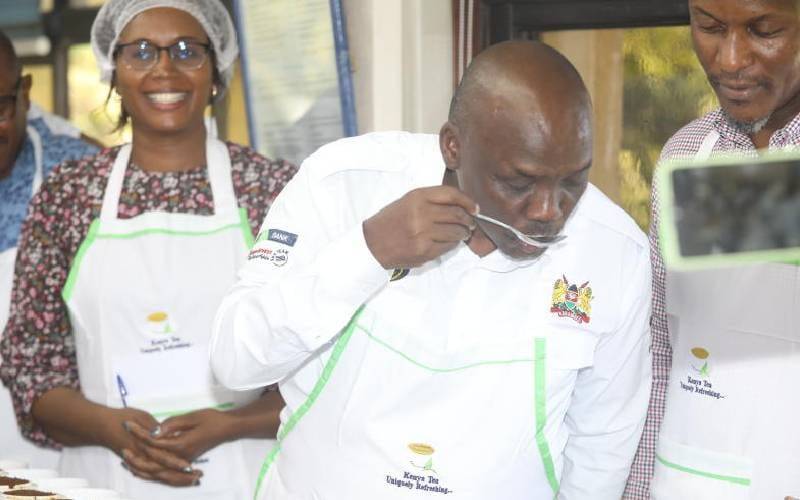Main Points In Hindi (मुख्य बातें – हिंदी में)
-
चाय मूल्य सुधार और किसान आय में वृद्धि: सरकार ने चाय की कीमतों में वृद्धि के लिए उपायों की घोषणा की है, जिसमें चाय उत्पादकों की आय बढ़ाने पर ध्यान केंद्रित किया गया है।
-
राज्य का नया चाय व्यापार मिशन: पारंपरिक मोम्बासा नीलामी पर निर्भर रहने के बजाय, केन्या सरकार ने चाय के लिए एक नया व्यापार मिशन स्थापित करने की योजना बनाई है, जिसका उद्देश्य नए और मौजूदा विदेशी बाजारों में चाय का विपणन करना है।
-
किसान सहायता और मूल्य संवर्धन कार्यक्रम: कृषि पीएस पॉल रोनोह ने छोटे किसानों के लिए मूल्य संवर्धन कार्यक्रम शुरू करने की बात की है, जिसमें चाय को पैक और ब्रांड करने के लिए उपयोगकर्ता सुविधाओं की स्थापना शामिल है।
-
स्थानीय चाय उपभोग की बढ़ती दिशा: सरकार युवाओं के बीच चाय की लोकप्रियता बढ़ाने के लिए रणनीतियों पर काम कर रही है, यह दर्शाते हुए कि घरेलू बाजार में चाय की खपत 10 प्रतिशत से कम है।
- उत्पादन में वृद्धि और निर्यात आय: 2024 की पहली छमाही में चाय का उत्पादन पिछले वर्ष की तुलना में 17 प्रतिशत बढ़ा है, साथ ही निर्यात आय में भी वृद्धि की उम्मीद है, जो चाय उत्पादकों को बेहतर रिटर्न प्रदान कर सकता है।
Main Points In English(मुख्य बातें – अंग्रेज़ी में)
Here are 5 main points regarding the information about the tea industry and government initiatives as discussed in the provided text:
-
Government Initiatives to Increase Tea Prices: The Kenyan government has announced measures to raise tea prices and improve farmers’ income, including the establishment of the Kenya Tea Trade Mission to market Kenyan tea in existing and new foreign markets instead of relying solely on traditional auctions in Mombasa.
-
Focus on Quality and Value Addition: Agriculture PS Paul Rono has emphasized the need for value addition programs for smallholder tea farmers. This includes creating user facilities for packing and branding tea to command higher prices in international markets, aiming for premium pricing that benefits local farmers.
-
Enhancing Domestic Tea Consumption: Strategies are being developed to encourage domestic consumption of tea, particularly among the youth, as the current market shows that less than 10% of tea is consumed locally. The aim is to promote tea as a preferred beverage, given its popularity worldwide after water.
-
Expected Production and Export Growth: The tea industry anticipates an increase in production from 570 million kilograms last year to over 600 million kilograms this year, aided by factors such as subsidized fertilizers. Additionally, tea export earnings are projected to rise, indicating significant growth in the sector.
- Sustainability and Quality Assurance: The government is focused on maintaining quality throughout the tea supply chain to ensure that consumers receive high-quality products. This involves proper handling of tea from farms through factories to the consumer market, ensuring it remains a quality product.


Complete News In Hindi(पूरी खबर – हिंदी में)
सरकार ने चाय की कीमतें बढ़ाने और किसानों की आय बढ़ाने के लिए कई उपायों की घोषणा की है।
मोम्बासा में पारंपरिक नीलामी पर भरोसा करने के बजाय, राज्य अब केन्या चाय व्यापार मिशन की स्थापना करेगा जो मौजूदा और नए विदेशी बाजारों में चाय का विपणन करेगा।
कृषि प्रधान सचिव पॉल रोनोह ने कहा कि टीम घंटी बजने पर चाय की नीलामी में दी जाने वाली कीमतों पर निर्भर होने के बजाय दुनिया भर में केन्याई चाय का विपणन करेगी।
रोनोह ने कहा कि मोम्बासा चाय की नीलामी में कम कीमत पर चाय बेची जा रही है, जिससे किसानों को कम रिटर्न मिल रहा है।
मोम्बासा में सरोवा व्हाइटसैंड्स बीच रिसॉर्ट में टी बोर्ड ऑफ केन्या (टीबीके) के वार्षिक शिखर सम्मेलन और शताब्दी समारोह को संबोधित करते हुए, पीएस ने कहा कि सरकार छोटे किसानों के लिए एक मूल्य-वर्धन कार्यक्रम लागू करेगी।
“जैसा कि हम प्रतिबिंबित करते हैं, हम इस बात पर ध्यान केंद्रित कर रहे हैं कि हमारे किसानों के लिए आय कैसे बढ़ाई जाए। हम चाहते हैं चाय को लाभदायक बनायें रणनीतियों के माध्यम से किसानों तक, ”उन्होंने कहा।
मूल्य संवर्धन पर, रोनोह ने घोषणा की कि सरकार आम उपयोगकर्ता सुविधाओं की स्थापना को प्राथमिकता दे रही है, जहां छोटे किसानों की चाय को अंतरराष्ट्रीय बाजार में उच्च कीमत दिलाने के लिए पैक और ब्रांड किया जाएगा।
उन्होंने कहा, “हम अपनी चाय सोने की कीमत पर बेचना चाहते हैं और अपने किसानों को अधिक रिटर्न दिलाना चाहते हैं।”
उन्होंने कहा कि सरकार चाय की स्थानीय खपत को विशेष रूप से युवाओं के बीच लोकप्रिय बनाने की रणनीतियों पर काम कर रही है, यह देखते हुए कि उत्पाद का 10 प्रतिशत से भी कम घरेलू बाजार के लिए है।
“हम युवाओं के लिए ऐसे उत्पाद लाने जा रहे हैं जिससे वे चाय के प्रति आकर्षित हो सकें। पानी के बाद चाय दुनिया में दूसरा सबसे ज्यादा पिया जाने वाला पेय है और हम चाहते हैं कि हमारी टेबल पर चाय हो, कुछ और नहीं,” उन्होंने कहा।
पीएस ने खुलासा किया कि सरकार गुणवत्ता बनाए रखने और बाजार का विस्तार करने के लिए किसान, कारखाने और गोदाम से चाय की देखभाल के लिए उत्सुक थी।
“चाय को किसानों से, कारखाने से और कारखाने के बाद अच्छी तरह से संभाला जाना चाहिए। यह उपभोक्ता तक उच्च गुणवत्ता का बना रहना चाहिए, ”उन्होंने कहा।
टीबीके के मुख्य कार्यकारी अधिकारी विली मुताई ने कहा कि अन्य कारकों के अलावा सब्सिडी वाले उर्वरक की उपलब्धता के कारण चाय उद्योग को पिछले साल उत्पादित 570 मिलियन किलोग्राम की तुलना में इस वर्ष 600 मिलियन किलोग्राम से अधिक उत्पादन की उम्मीद है।
मुताई ने कहा कि मोम्बासा चाय का एक महत्वपूर्ण केंद्र बन गया है और 13 अफ्रीकी देश तटीय शहर के माध्यम से अपनी उपज का निर्यात करते हैं।
टीबीके के अध्यक्ष जैकब काहिउ ने आश्वासन दिया कि वे चाय उद्योग में कुछ हितधारकों के साथ मतभेदों को सुलझाने के इच्छुक हैं जो बोर्ड को अदालत में ले गए थे।
उन्होंने कहा कि 1924 में वाणिज्यिक चाय उत्पादन की शुरुआत के बाद से चाय क्षेत्र ने मील के पत्थर दर्ज किये हैं।
सूचित रहें. हमारे न्युजलेटर की सदस्यता प्राप्त करें
केन्या चाय विकास एजेंसी (केटीडीए) के मुख्य कार्यकारी अधिकारी विल्सन मुथौरा ने किसानों से कहा वैश्विक अभ्यास का पालन करें गुणवत्ता बनाए रखने के लिए दो पत्तियां और एक कली तोड़ें।
उन्होंने कहा कि हालांकि किसानों को अभी भी अपनी उपज से अधिकतम रिटर्न नहीं मिला है, लेकिन स्थिति में सुधार हुआ है और हाल ही में उन्हें प्रति माह 25 रुपये प्रति किलो और प्रति वर्ष 60 रुपये प्रति किलो मिलते हैं।
उन्होंने कहा, “हमें अपने बाजार का विस्तार करने के लिए घरेलू स्तर पर चाय की खपत की संस्कृति को भी बदलना होगा।”
उप राष्ट्रपति किथुरे किंडिकी के शुक्रवार को शिखर सम्मेलन में मुख्य भाषण देने की उम्मीद है।
कृषि और पशुधन विकास मंत्रालय ने बताया कि उर्वरक सब्सिडी कार्यक्रम के तहत 2024 की छमाही अवधि में चाय का उत्पादन 2023 की समान अवधि की तुलना में 273.64 मिलियन किलोग्राम से बढ़कर 321.09 मिलियन किलोग्राम हो गया है।
यह 47.44 मिलियन किलोग्राम या 17 प्रतिशत की वृद्धि दर्शाता है।
2024 की छमाही अवधि के लिए चाय निर्यात आय 23.77 प्रतिशत (Sh18.83 बिलियन) बढ़कर Sh98.07 बिलियन हो गई, जो 2023 की छमाही अवधि के दौरान दर्ज की गई Sh79.23 बिलियन थी।
सरकार को उम्मीद है कि 2023 में निर्यात आय Sh180.57 बिलियन से Sh30.7 बिलियन बढ़कर Sh211.27 बिलियन हो जाएगी।
मंत्रालय का कहना है कि वह इसके माध्यम से कृषि निर्यात के मूल्य को बढ़ावा देने का इच्छुक है मूल्य संवर्धन और इसके परिणामस्वरूप वर्ष 2027 तक चाय उत्पादकों को प्रति किलोग्राम हरी पत्ती पर 100 रुपये का औसत भुगतान करके उच्च रिटर्न में योगदान दिया जाएगा।
पिछले साल, चाय उद्योग ने Sh180.57 बिलियन की उच्चतम निर्यात आय दर्ज की।
यह 2022 में दर्ज Sh138.09 बिलियन और 2021 में Sh136.59 बिलियन से वृद्धि दर्शाता है।
चाय किसानों को हरी पत्ती का भुगतान पिछले साल बढ़कर औसतन Sh59.02 हो गया, जो 2022 में Sh50.18 और 2021 में Sh34.71 था।
Complete News In English(पूरी खबर – अंग्रेज़ी में)
The government has announced several measures to raise tea prices and increase farmers’ incomes.
Instead of relying solely on traditional auctions in Mombasa, the state will establish a Kenya Tea Trade Mission to promote tea in existing and new foreign markets.
Agriculture PS Paul Rono mentioned that this team will market Kenyan tea globally rather than depending on auction prices.
Rono noted that tea prices at the Mombasa auction have been low, resulting in lesser returns for farmers.
Speaking at the Tea Board of Kenya (TBK) annual summit held at the Sarova Whitesands Beach Resort in Mombasa, he said the government will implement a value-addition program for small farmers.
“As we reflect, we are focusing on increasing income for our farmers. We want to make tea profitable through various strategies for our farmers,” he said.
Regarding value addition, Rono announced that the government will prioritize setting up user-friendly facilities to package and brand small farmers’ tea for higher prices in the international market.
“We want to sell our tea at gold prices and ensure better returns for our farmers,” he added.
He also mentioned that the government is working on strategies to promote local tea consumption, especially among the youth, noting that only about 10% of the product is consumed domestically.
“We are going to introduce products that appeal to the youth, as tea is the second most consumed beverage in the world after water. We want tea to be on our tables,” he stated.
The PS revealed that the government is keen on maintaining quality and expanding the market by ensuring proper handling of tea from farmers to factories to consumers.
“Tea must be well-handled from the farmers, in the factories, and after processing. It should maintain high quality until it reaches the consumer,” he emphasized.
TBK CEO Willy Mutai stated that, among other factors, the availability of subsidized fertilizers is expected to increase tea production this year to over 600 million kilograms compared to 570 million kilograms last year. He mentioned that Mombasa has become a significant hub for tea exports for 13 African countries.
TBK Chairman Jacob Kahiu assured that they are willing to resolve differences with some stakeholders in the tea industry who have taken the board to court.
He noted that the tea sector has achieved significant milestones since the start of commercial tea production in 1924.
Stay informed. Subscribe to our newsletter.
Kenya Tea Development Agency (KTDA) CEO Wilson Muthauria urged farmers to follow global practices by picking two leaves and a bud to maintain quality.
He acknowledged that while farmers still face challenges in getting maximum returns from their produce, the situation has improved, with recent earnings reaching Ksh 25 per kilogram per month and Ksh 60 per kilogram annually.
“We need to shift the culture of tea consumption at the local level to expand our market,” he added.
Vice President Kithure Kindiki is expected to deliver the keynote address at the summit on Friday.
The Ministry of Agriculture and Livestock Development reported that tea production under the fertilizer subsidy program increased from 273.64 million kilograms in the first half of 2023 to 321.09 million kilograms in the same period of 2024, marking a 17% rise.
Tea export earnings for the first half of 2024 rose by 23.77% (Ksh 18.83 billion) to Ksh 98.07 billion compared to Ksh 79.23 billion in the first half of 2023.
The government expects tea export earnings to increase from Ksh 180.57 billion in 2023 to Ksh 211.27 billion, an increase of Ksh 30.7 billion.
The Ministry aims to enhance the value of agricultural exports through value addition, projecting to provide tea producers with an average payment of Ksh 100 per kilogram of green leaves by 2027.
Last year, the tea industry recorded the highest export earnings of Ksh 180.57 billion, up from Ksh 138.09 billion in 2022 and Ksh 136.59 billion in 2021.
Payments to tea farmers for green leaves increased to an average of Ksh 59.02 last year, compared to Ksh 50.18 in 2022 and Ksh 34.71 in 2021.








